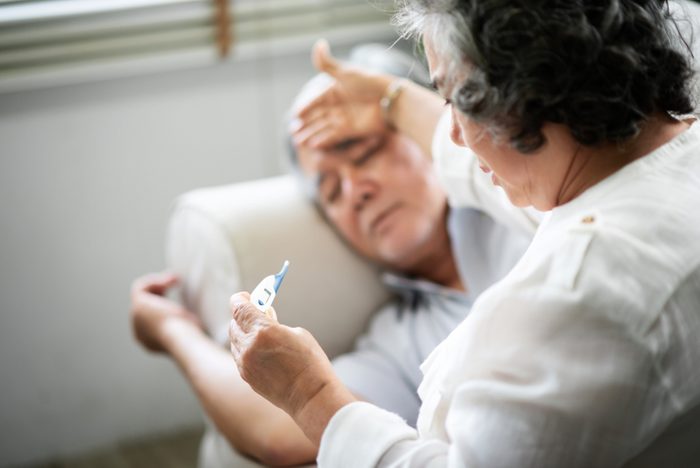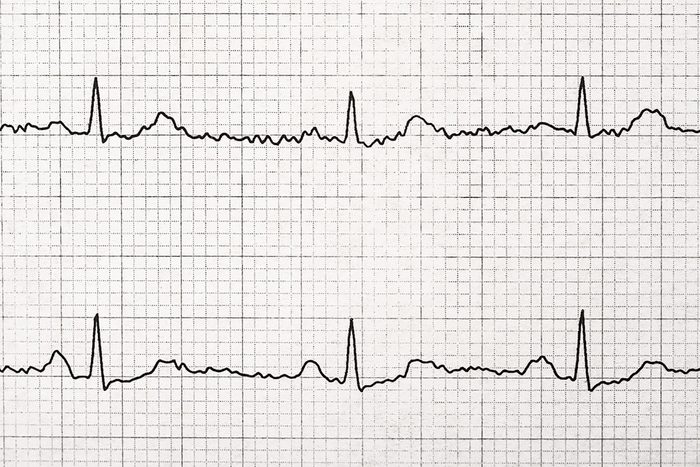
First: What is a fever?
Anytime your body temperature increases to 100.4 degrees Fahrenheit or higher, you have a fever. “Normal body temperature is 98.6, and some people tend to run a little lower or higher, but anything over 100.4 is considered a fever,” says Deborah Nunziato-Ghobashy, DO, family medicine physician at Scarsdale Medical Group. Most of the time it’s the body’s natural response to an infection.

The best way to take your temperature
So you have to make sure you actually have a fever: You can find several types of thermometers at the drugstore, including oral, rectal, ear (tympanic), and forehead (temporal artery). The Mayo Clinic says you can also use an oral thermometer for an armpit (axillary) reading, but you won’t get the most accurate measurement that way. A rectal thermometer with a dab of petroleum jelly on the bulb is recommended for infants.

What’s a “normal” temperature?
Normal body temperature varies throughout the day, according to the Mayo Clinic. It tends to be lower in the morning and higher in the late afternoon and evening. Although most people consider 98.6 normal, your body temperature can vary by a degree or more—from about 97 to 99—and still be considered normal. Here are more things you never knew about your body temperature.

What causes a fever?
“Usually your body is sensing some kind of foreign invader, whether it’s bacterial or viral,” says Dr. Nunziato-Ghobashy. “It’s something that’s not supposed to be there.” The hypothalamus in the brain controls body temperature and raises it as a defense against anything that could be invading the body. “The fever isn’t caused by the invaders themselves but by the body’s response to finding them there.” The foreign particles can’t survive at a temperature above 98.6. “It’s too hot for them,” says Dr. Nunziato-Ghobashy. The fever’s part of your body’s immune response—and these are the 12 habits that can boost your immunity.

Why a fever makes you feel lousy
“A fever itself is not the problem,” says Dr. Nunziato-Ghobashy. “It’s actually a good thing that your body is doing the right thing to fight off the germs.” But the side effect is that your energy drops and you feel weak. “When your body is at a higher temperature than the room, you start to get chills. You may also experience muscle aches, sweating, and weakness. Check out these tips on what to do when you start feeling sick.

What’s happening to your body
A fever affects every part of your body. “Your heart rate gets faster and everything responds to a faster pulse,” says Dr. Nunziato-Ghobashy. “The kidneys have to work harder because the pulse is faster. You start to eliminate waste products faster. Everything is moving along at a faster rate due to your metabolism speeding up.” You also begin to perspire because of the increase in body temperature.

The right response to a fever
You don’t need to do anything if you don’t feel too bad—that’s usually the case with a low fever. “You can let your body go through its own natural process,” says Dr. Nunziato-Ghobashy. But when the fever leads to chills, aches, or feeling run down, you can treat the symptoms. She recommends over-the-counter pain reliever and fever reducers, such as ibuprofen or acetaminophen. “That will usually help you feel better.” Note that you shouldn’t give ibuprofen to children under six months of age; kids and teens should avoid aspirin—discuss its use with your pediatrician. And watch out for the times ibuprofen won’t work—and could be dangerous.

Other ways to lower your body temperature
When you have that crummy fever feeling, take it as a sign that your body is telling you to rest—that will help you fight off the illness faster. Here are some other suggestions from the University of Pittsburgh Medical Center:
• Remove heavy clothing and blankets and keep the room cool but not cold
• Try taking a lukewarm bath
• Drink lots of fluids
• Avoid ice baths and alcohol rubs, which can induce shivering and raise body temperature even more

When it’s time to worry
If your fever doesn’t subside within three days—especially if you’re taking OTC medication—it’s time to see a doctor. You may have an infection (such as strep throat or a urinary tract infection) and require antibiotics, or you may have a more serious problem, such as pneumonia, a blood clot, or an MRSA infection. “My main message to patients is that if a fever is not getting better and it’s been a few days, you need a trained clinician to look at you,” says Dr. Nunziato-Ghobashy.

Signs you need medical care
“Most of the time, a primary care physician can take care of a fever,” says Dr. Nunziato-Ghobashy. After hours or on holidays, you’ll need to go to the ER, of course. “Severe abdominal pain, chest pain, or intractable nausea and vomiting that pushes you to the point of dehydration is also an indication to go to the ER,” she says. Other symptoms that warrant medical attention: severe headache, seizures, mental confusion, stiff neck, rash, and bruising. Know these secrets the ER staff won’t tell you.

The numbers you need to know
Certain temps are a cause for concern, reports the University of Pittsburgh Medical Center: Any fever of 100.4 or higher in a child under three months old is an emergency. For children between three and 12 months of age, a fever of 102.2 should be evaluated by a physician. For adults, 103 is cause for concern if the fever lasts more than 48 hours or keeps rising. A fever of 105 signals that it’s time for a trip to the ER.

Febrile seizures
This is a convulsion in children triggered by a spike in body temperature, according to the Mayo Clinic. The seizures often occur during the first 24 hours after the onset of a fever. They’re terrifying to witness: The child shakes, loses consciousness, and may get very stiff or twitch the arms or legs. Keep the child safe during the seizure—they tend to be brief—and offer comfort afterward; call a doctor and have the child evaluated as soon as possible. Most of the time, the seizure has no long-lasting effects. If the seizure lasts longer than five minutes or is accompanied by vomiting, a stiff neck, breathing problems, or extreme sleepiness, go to the ER.

Don’t get sick in the first place
The simplest way to avoid a fever is to avoid infections, advises the Mayo Clinic—here’s how to stay well:
• Wash your hands often—with hot water, soap, and for at least 20 seconds. This is especially important before eating and after using the bathroom, spending time in a crowd, being around a sick person, or petting animals.
• Carry hand sanitizer for the times you don’t have access to soap and water.
• Avoid touching your nose, eyes, or mouth as these are the main ways viruses and bacteria enter the body.
• Cover your mouth—with your elbow, not your hand—when you cough and sneeze.
You’ll also want to know these tips from people who never get sick as well.
